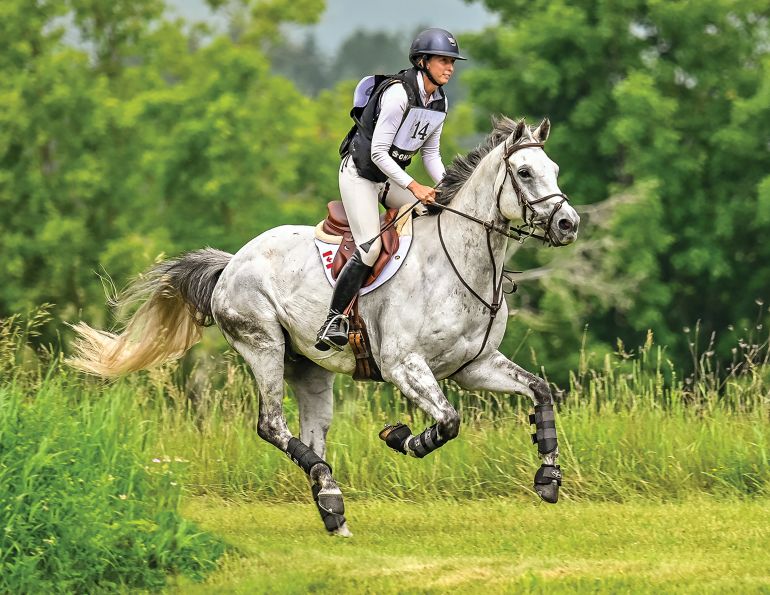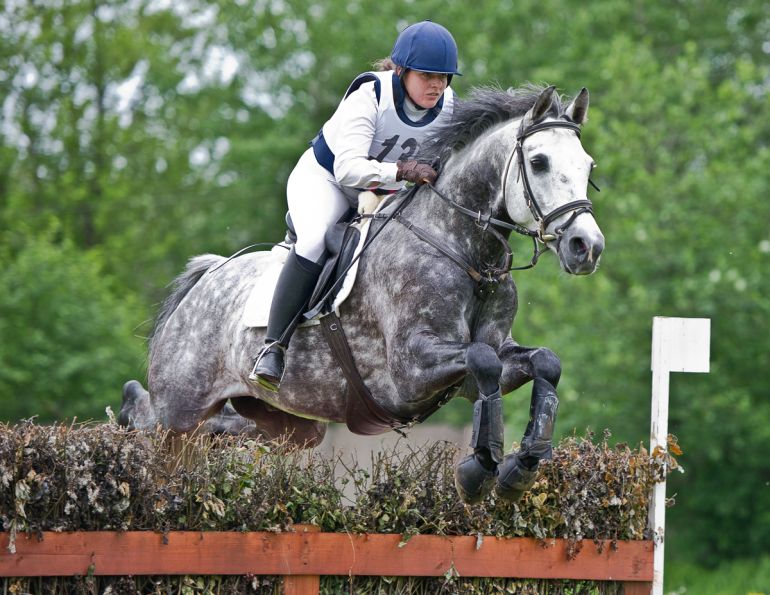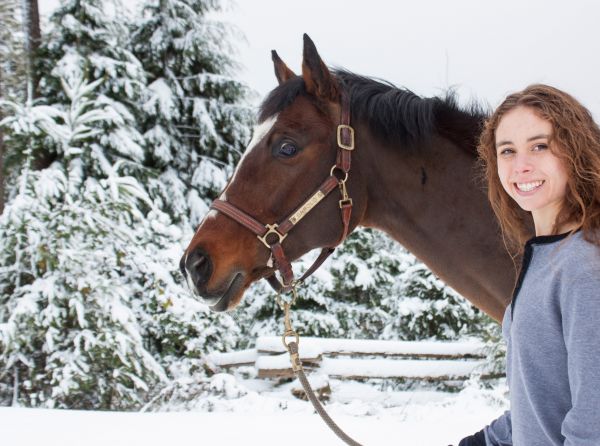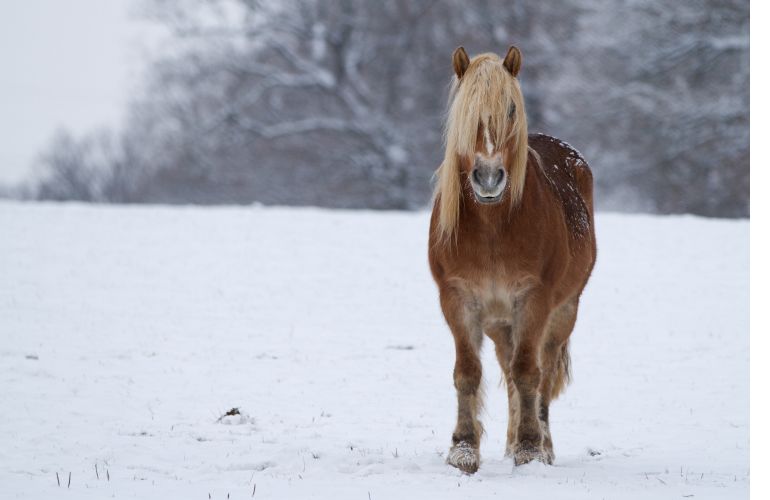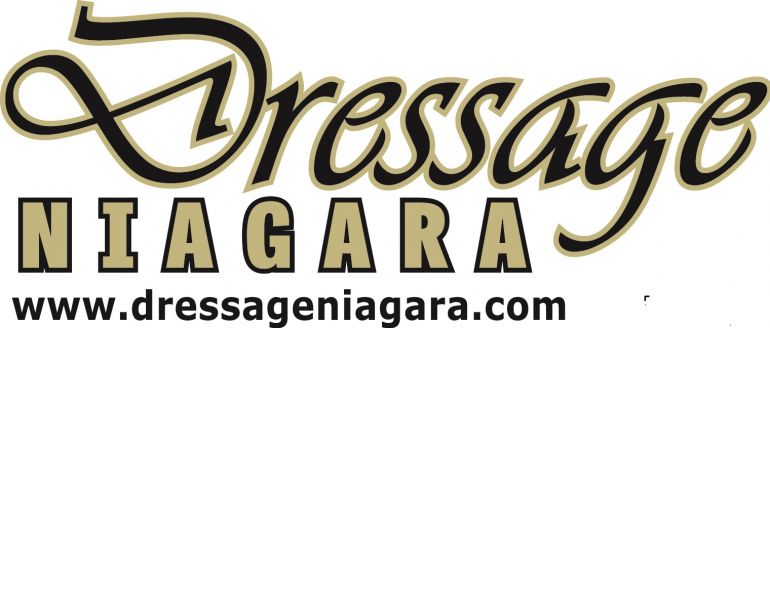By April Clay, M.Ed., Registered Psychologist
“To aim at an objective or object”
“To make prepared for a test of skill”
This is what training amounts to according to Merriam-Webster. What does it mean to you?
Okay, so training means the obvious: attempting to learn, and scheduling time for that learning. This we all know very well. What is less familiar, less practiced, are elements that support and facilitate this learning. So to create your ideal learning environment, here are a few things to consider:
Clear The Way
You can begin by preparing yourself to have the best conversation possible with your horse. This means you have to clear yourself of the day. Maybe you had an especially taxing day at work and you are frazzled to the bone. Or somebody hit your car in the parking lot and you’re vibrating with anger. You wouldn’t want to pay for someone else’s experiences, and neither should your horse.
So in the spirit of fairness, both to your horse’s sanity and your training goals, the least you can do is start fresh. “Clearing strategies” come in various forms. For some, a ritual like the changing into your riding clothes means both shedding your work persona and putting on your riding role. Or, try a full body and mind scan starting at the top of your head. Release tension as you draw your awareness to each area, and by the time you get to the bottom of your feet you’ll be ready to go! Finally (but not, because this exercise is only limited by your imagination) try a visual metaphor to assist with this cleansing. Park your daily troubles in a parking stall (or your horse’s stall) until is appropriate to deal with them. Sweep the cobwebs from your brain with a big fluffy pink duster! Anything will do, as long as it carries meaning for you. A bonus for this last type of strategy is you can easily employ some humour — something which may have an added benefit to your emotional state.
Getting into the habit of “clearing” makes good sense when you think about it. It leaves you more open to learning. Your focus is more highly trained (kind of like a laser) on your task, and not split in two. The benefit to your horse is that you are less likely to deliver those nasty double messages he so loathes. You know... when you want him to go forward but because of your unconscious anger you jerk his mouth instead? He could do without that (and so could you).
Train Smart Not Hard
What is your belief about training? Is it that the harder you work, the more you will succeed? Does this translate into hours? So the more hours you put in, the more fabulous you will be in the tack? Good thing your horse doesn’t understand English, or else we would have to cover his ears lest he be let in on this grueling plan of yours.
It is a common myth. It’s the reason why we spend too many hours at work, or feel guilty for not spending enough time with our family. We throw quality out the window and go for sheer stamina.
It’s healthy for all athletes to challenge this training myth. For those involved in physically grueling sports, it’s a must. If they use the “go hard or go home” philosophy with abandon, chances are their bodies with not peak at the right time. As for riders, well, your horses will snort and blow with gratitude! Look at it this way, is it better to have a 20 minute session about increasing your horse’s sensitivity to your leg (and ending on a good note) or, an hour of working on six issues simultaneously that ends in frustration? More is certainly not better. Better is better. Keep this in focus.
A final reason to consider your “training smart” philosophy is the mental and physical freshness of you and your horse. If you go at it too hard, all the time, you will both burn out. Worse yet, it’s the way some injuries (both person and equine) occur.
Consider Who Is Involved
Because we are blessed with partners who do not speak English, we unfortunately sometimes take their presence for granted. Who is “in training” — you or your horse? For even the most seasoned professionals, the answer is: both. You are training your team, your relationship. You are trying to improve the communications you and your horse have daily to meet some kind of goal. Too many riders tend to over focus in one area or the other. Some riders become so obsessed with their performances, they forget to listen and check in with their horse! These are the riders heavy into self-evaluation. Daily, there are “goods and bads” about their ride. The process tends to get lost, and so does the horse. Others try to make things happen with their horse but forget they are a vital link in that learning process. This dissociation also imbalances training, with a tendency to blame the horse for all that doesn’t go quite right. As the leader of this relationship, you are ultimately responsible for managing both of you.
One way to do this is to ensure your training goals are reflective of a partnership, not a solo sport. And while we are on the topic of goal setting...
Daily Practice Goals
Your practice goal determines your focus for the day. And how do you determine what a practice goal may be? Well, that depends. Have you done your goal setting work for the season?
Let’s assume you are the dedicated rider and you have in fact completed your planning. What you should have are a set of dream goals, broken down into long term goals, broken down into short term goals. Whew! But it doesn’t end there. At the bottom of this “tree” are your practice goals, the smallest link in the chain, which may be something as simple as “today I will work at holding by body position more consistently”. Who would know this itsy bitsy focus could relate to being a grand prix rider? This is where many people fall down in their goal setting efforts. They know where they want to go, they just haven’t looked into drawing a map to get there — a really detailed one. Another great thing about using such detail is how possible your dreams will seem. No longer are they the stuff of fairytales, or reserved for other people somehow more special than you. Practice goals have a very equalizing quality.
Be Really Present
If you were told to train somebody new at work, you wouldn’t begin to talk to them and then walk out mid sentence to get yourself some lunch or worry about your taxes. But we do this to our horses all the time. And, much like our disillusioned co-worker, the horse will often veer off into its own agenda. The real unfortunate part is when we end up disciplining them for this lapse, when we were the first to leave.
Staying present means learning to place and keep your mind on the conversation with your horse. In this way, riding can be said to be a meditative act. Experienced riders will tell you they have learned to “place their minds” on their task and keep it there. If it veers, show some compassion for yourself and your horse. Gently bring both of you back. Start up your conversation anew.
Good meditators, like good riders, don’t start out with an in-born ability to avoid distraction. It is trained over time, in both cases. To train your present moment focus, start by picking a present moment anchor. This might be the feel of your horse underneath you, the track you are riding, or the “clop” of hooves. Once you have decided on your anchor, lock on. Place your mind there. Know it will wander. Bring it back, and bring it back again. If you see this as a natural part of training yourself to be present, you will have an easier time. If you start to curse yourself for thinking about lunch or where you put your keys, you will only burn energy. That’s exactly the place you have to practice compassion for your waverings. Compassion, after all, is good for the soul too — and the horse.
To read more articles by April Clay on this site, click here.
Main photo: Courtesy of Troxel - Remember to train smarter not harder. Both horse and rider should look forward to the training session as a positive, rather than a grueling, experience.








